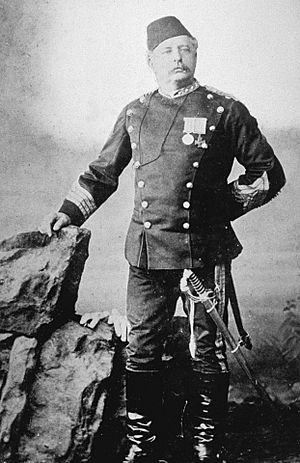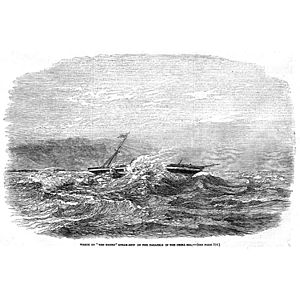Charles George Baker facts for kids
Quick facts for kids
Charles George Baker
VC
|
|
|---|---|
 |
|
| Born | 8 December 1830 Noakhali, |
| Died | 19 February 1906 (aged 75) Southbourne, Dorset |
| Buried |
Christchurch Cemetery, Dorset
|
| Allegiance | United Kingdom |
| Service/ |
|
| Rank | Major General |
| Battles/wars |
|
| Awards | |
| Other work | Head of the Egyptian Police Force |
Charles George Baker (born December 8, 1830 – died February 19, 1906) was a brave British officer. He served in many different roles throughout his life. He was an officer in the Merchant Navy, then in the Bengal Army in India, and later in the Turkish Army. He even became the head of the police force in Egypt.
Baker is famous for two main reasons. First, he bravely rescued people from a shipwreck. Second, he received the Victoria Cross. This is the highest award for bravery in the face of the enemy for British and Commonwealth forces. He was a Major General in the Turkish Army and later led the Egyptian Police.
Contents
Early Life and Education
Charles George Baker was born in Noacolly, which is now Noakhali, in British India. His birthday was December 8, 1830. His parents, John and Lydia Baker, were from England. His father was a doctor for the East India Company.
When Charles was young, he was sent to England for school. He studied in towns called Halesworth and Lowestoft in Suffolk.
The Douro Shipwreck Rescue
In 1854, Charles Baker was working for a shipping company. He was the Second Officer on a passenger ship called the Douro. One day, while sailing near the Paracel Islands, the ship hit a hidden rock and was wrecked.
On May 26, Baker decided to take action. He got into a small boat called a Jolly boat with seven other volunteers. They planned to sail to Hainan island, which was about 123 miles away. When they reached Hainan, they couldn't find anyone living there. So, they decided to try and reach Hong Kong instead.
Their journey was very dangerous. They met pirates who refused to help them unless they gave up all their valuables. The small boat managed to escape, even though the weather was bad and water was getting into the boat.
After sailing more than 500 miles, they finally reached Hong Kong on June 3. Baker quickly reported the shipwreck. Because of his brave actions, other ships were sent to rescue the passengers and crew of the Douro. Almost everyone was saved, with only one person from the ship's crew being lost.
Military Adventures
Soon after the shipwreck, Baker joined the East India Company's Bengal Army. He became an officer in the Bengal Military Police Battalion. He was the second-in-command of this unit when it was formed in 1856. Baker served with them during the Indian Mutiny, a major uprising in India.
Winning the Victoria Cross
In September 1858, when Baker was 27 years old, he was a lieutenant. His cavalry unit was helping to protect the Grand Trunk Road. On September 27, Baker led a daring attack against rebel forces at a place called Suhejnee.
Baker's report described how his small cavalry group faced a much larger enemy force. The rebels had between 900 and 1000 foot soldiers and 50 cavalry. Baker's group had only about 117 cavalry soldiers. The enemy advanced, but Baker cleverly made his troops slowly retreat. Then, when the rebels were in the open, he suddenly turned his cavalry around and charged!
His troops bravely rode through the enemy lines. Even though the ground was muddy and difficult for the horses, they kept going. The pursuit continued for over two miles, with Baker's men even swimming across a deep river. They chased the rebels into thick jungles.
Only one of Baker's men was killed, and 17 were wounded during this brave fight. When the leader of the army in India, General Campbell, heard about Baker's actions, he was very impressed. He said that Lieutenant Baker's actions were "deserving of the highest praise." General Campbell believed that Baker should receive the Victoria Cross for his amazing bravery.
Later Military Career
After the Indian Mutiny, Baker continued his service. He took part in an expedition to Sikkim in 1861. He later became a senior police officer in Bengal.
After leaving India, Baker joined the Turkish Army. He fought in the Russo-Turkish War. During this war, he was even captured by the Russians. For his service, the Sultan of Turkey made him a Major General and gave him the title of Lewa Pasha.
Baker then moved to Egypt. He worked with his brother, Valentine Baker, in the Egyptian police force. Eventually, Charles Baker took over as the head of the Egyptian police. He held this important job until he retired in 1895.
Retirement and Passing
After a long and adventurous career, Major General Baker retired from his work in Egypt. He moved to Southbourne in England with his wife, Charlotte. He passed away on February 19, 1906, in Southbourne. He was buried in Christchurch Cemetery in Dorset.
 | Lonnie Johnson |
 | Granville Woods |
 | Lewis Howard Latimer |
 | James West |


